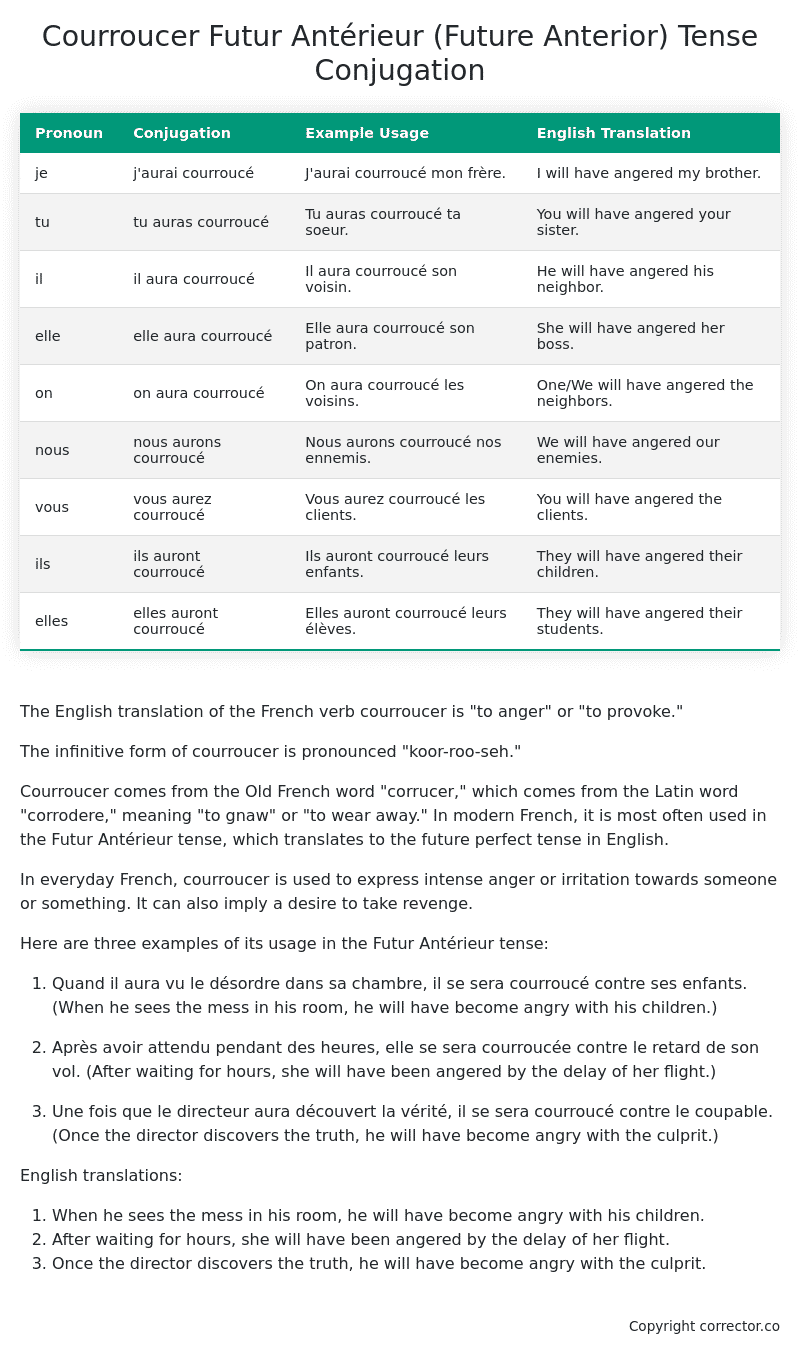Futur Antérieur (Future Anterior) Tense Conjugation of the French Verb courroucer
Introduction to the verb courroucer
The English translation of the French verb courroucer is “to anger” or “to provoke.”
The infinitive form of courroucer is pronounced “koor-roo-seh.”
Courroucer comes from the Old French word “corrucer,” which comes from the Latin word “corrodere,” meaning “to gnaw” or “to wear away.” In modern French, it is most often used in the Futur Antérieur tense, which translates to the future perfect tense in English.
In everyday French, courroucer is used to express intense anger or irritation towards someone or something. It can also imply a desire to take revenge.
Here are three examples of its usage in the Futur Antérieur tense:
-
Quand il aura vu le désordre dans sa chambre, il se sera courroucé contre ses enfants. (When he sees the mess in his room, he will have become angry with his children.)
-
Après avoir attendu pendant des heures, elle se sera courroucée contre le retard de son vol. (After waiting for hours, she will have been angered by the delay of her flight.)
-
Une fois que le directeur aura découvert la vérité, il se sera courroucé contre le coupable. (Once the director discovers the truth, he will have become angry with the culprit.)
English translations:
- When he sees the mess in his room, he will have become angry with his children.
- After waiting for hours, she will have been angered by the delay of her flight.
- Once the director discovers the truth, he will have become angry with the culprit.
Table of the Futur Antérieur (Future Anterior) Tense Conjugation of courroucer
| Pronoun | Conjugation | Example Usage | English Translation |
|---|---|---|---|
| je | j’aurai courroucé | J’aurai courroucé mon frère. | I will have angered my brother. |
| tu | tu auras courroucé | Tu auras courroucé ta soeur. | You will have angered your sister. |
| il | il aura courroucé | Il aura courroucé son voisin. | He will have angered his neighbor. |
| elle | elle aura courroucé | Elle aura courroucé son patron. | She will have angered her boss. |
| on | on aura courroucé | On aura courroucé les voisins. | One/We will have angered the neighbors. |
| nous | nous aurons courroucé | Nous aurons courroucé nos ennemis. | We will have angered our enemies. |
| vous | vous aurez courroucé | Vous aurez courroucé les clients. | You will have angered the clients. |
| ils | ils auront courroucé | Ils auront courroucé leurs enfants. | They will have angered their children. |
| elles | elles auront courroucé | Elles auront courroucé leurs élèves. | They will have angered their students. |
Other Conjugations for Courroucer.
Le Present (Present Tense) Conjugation of the French Verb courroucer
Imparfait (Imperfect) Tense Conjugation of the French Verb courroucer
Passé Simple (Simple Past) Tense Conjugation of the French Verb courroucer
Passé Composé (Present Perfect) Tense Conjugation of the French Verb courroucer
Futur Simple (Simple Future) Tense Conjugation of the French Verb courroucer
Futur Proche (Near Future) Tense Conjugation of the French Verb courroucer
Plus-que-parfait (Pluperfect) Tense Conjugation of the French Verb courroucer
Passé Antérieur (Past Anterior) Tense Conjugation of the French Verb courroucer
Futur Antérieur (Future Anterior) Tense Conjugation of the French Verb courroucer (this article)
Subjonctif Présent (Subjunctive Present) Tense Conjugation of the French Verb courroucer
Subjonctif Passé (Subjunctive Past) Tense Conjugation of the French Verb courroucer
Subjonctif Imparfait (Subjunctive Imperfect) Tense Conjugation of the French Verb courroucer
Subjonctif Plus-que-parfait (Subjunctive Pluperfect) Tense Conjugation of the French Verb courroucer
Conditionnel Présent (Conditional Present) Tense Conjugation of the French Verb courroucer
Conditionnel Passé (Conditional Past) Tense Conjugation of the French Verb courroucer
L’impératif Présent (Imperative Present) Tense Conjugation of the French Verb courroucer
L’infinitif Présent (Infinitive Present) Tense Conjugation of the French Verb courroucer
Struggling with French verbs or the language in general? Why not use our free French Grammar Checker – no registration required!
Get a FREE Download Study Sheet of this Conjugation 🔥
Simply right click the image below, click “save image” and get your free reference for the courroucer Futur Antérieur tense conjugation!

Courroucer – About the French Futur Antérieur (Future Anterior) Tense
Construction
Common Everyday Usage Patterns
Interactions with Other Tenses
For example
Summary
I hope you enjoyed this article on the verb courroucer. Still in a learning mood? Check out another TOTALLY random French verb conjugation!


